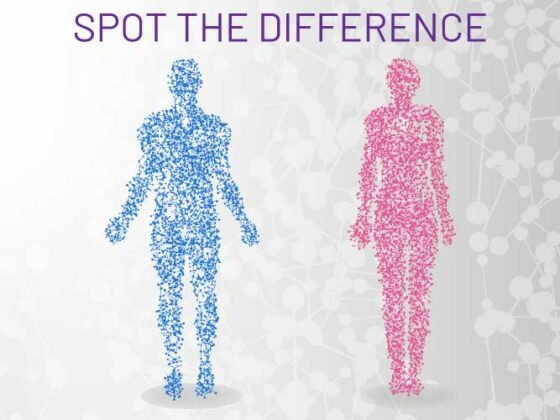In breast cancer the risk of metastasis is higher among women diagnosed at a younger age, those with larger tumours at diagnosis and those with luminal B breast cancer. The study, abstract 0R-91, presented at the Advanced Breast Cancer Sixth International Consensus Conference, held virtually 4-6 November, represents the first global systematic review and meta-analysis to explore the risk of early breast cancer spreading to other parts of the body.
While most women with breast cancer are diagnosed when their cancer is confined to the breast, in some women it goes on to metastasise to other parts of the body (most commonly liver, brain, bones or lungs). Metastatic cancer, also known as advanced cancer and stage 4 cancer, is harder to treat and the risk of dying is higher.
“Until now we haven’t known how many women with breast cancer go on to develop metastatic cancer because cancer registries have not routinely collected this data,” explains study presenter Eileen Morgan, from the International Agency for Research on Cancer (IARC), Lyon, France. The data, she adds, is urgently needed to assess effectiveness of different treatment strategies, evaluate patient prognosis, and plan service provision. “We want to make patients with metastatic breast cancer more visible, which is a key component for future research and eventually achieving better outcomes for this patient group.”
The primary objective of the study, led by researchers Eileen Morgan and Melina Arnold and funded by the Susan G Komen Breast Cancer Foundation, was to conduct a systematic review and meta-analysis to explore how different factors influence the risk of metastasis in women diagnosed with breast cancer. For the study, 409 relevant studies published since 2010 were identified from a systematic search of MEDLINE and Web of Science. For the preliminary analysis (involving 257 of the 409 identified studies), the investigators started by analysing the contribution of age at diagnosis, different breast cancer types and stages of breast cancer.
Overall, results showed risk of metastasis for most breast cancer patients is between 6% and 22% for women in the middle two quartiles (with a quarter of women having a lower risk and a quarter of women a higher risk). Initial results demonstrate distant recurrences to be higher in:
- Hospital-based studies compared to studies that identified patients through population-based cancer registries. Women from hospital studies had a 2.0% to 35.5% risk of metastasis vs 3% to 19.2% for women from population-based cancer registries.
- Women diagnosed at a younger age. Women first diagnosed below the age of 35 years had a 12.7% to 38% risk of metastasis vs 3.7% to 28.6% for women aged 50 years or older.
- Women with larger sized cancers. Women with T3/T4 (defining larger sized tumours) had a 37.5% to 52.3% risk of metastasis vs 4.9% to 15.4% for women with stage I (defining smaller sized tumours).
- Women with luminal B breast cancer. Women diagnosed with luminal B cancer had a 4.2% to 35.5% risk of metastasis vs 2.3% to 11.8% for women diagnosed with luminal A cancer.
The study also revealed higher proportions of recurrence in studies of patients from earlier periods of diagnosis, with 35.6% experiencing metastasis among those diagnosed in the period 1978-87, 31.6% in 1988-97, 18.9% in 1990-94, 14.5% in 1995-99, 20.3% in 1998-2006, 2.8% in 2000-06, and 7.4% in 2007-13. “We need to consider whether this difference is due to changes in the treatment and diagnosis of breast cancer or due to longer follow-up of women diagnosed in earlier periods meaning a greater chance that metastasis could occur,” says Morgan. To resolve this question, she adds, in the main analysis they plan to explore time since diagnosis.
The main analysis will also explore effects of different treatments, the different sites of metastasis and data for different country/world regions.
Ultimately, says Morgan, the study should help to define a common vocabulary for recurrent metastatic breast cancer. “For data from different cancer registries to be comparable, investigators and cancer registries around the world need guidelines on how to define breast cancer recurrence in the same way. We are currently working with cancer registries from five countries and are also coordinating our efforts with colleagues at NCI to ultimately come up with recommendations regarding the collection of recurrence data in the cancer registry setting. IARC has a lot of experience with setting up guidelines that serve as global references and working with large networks of registries internationally.”
Commenting on the study, Shani Paluch-Shimon, Director of the Breast Unit at Hadassah University Hospital, Israel, says, “There has been a knowledge gap about how many people are living with advanced breast cancer around the world. This study is a step towards filling that gap.“
The 6th ESMO Clinical Practice Guideline for the diagnosis, staging and treatment of patients with metastatic breast cancer were published in October. The guideline includes algorithms covering diagnosis, staging, risk assessment and treatment based on available evidence and expert opinion. Key points mentioned include involvement of multidisciplinary teams being ‘a prerequisite for optimal management’, that the team should begin with biopsies to confirm histology and reassess tumour biology, and that CT of the chest and abdomen plus bone scintigraphy should be minimum procedures for staging. The guideline also states that all recommendations for care need a shared decision making approach with patients and that palliative care should be integrated early and include outpatient and inpatient care.
The guideline also provides graded recommendations for different treatments based on their scoring and performance within ESMO’s Magnitude of Clinical Benefit Scale and the ESMO Scale for the Clinical Actionability of Molecular Targets. “Considering the irrepressible explosion of new data and the advances driven by translational research in the current era of precision oncology, we will be regularly updating these new guidelines in real time. As such, they will be published on ESMO’s website as a dynamic and interactive tool,” says Cristina Saura, a member of the guideline committee from Vall D’hebron Institute of Oncology, Barcelona, Spain.












